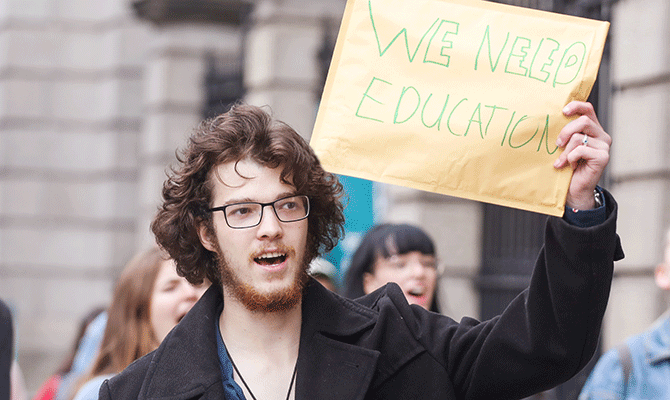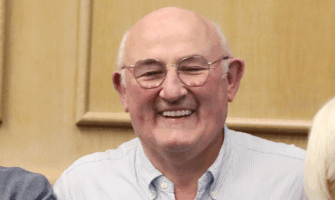
László Molnárfi
STUDENT ACTIVIST László Molnárfi (20) has captured lightning in a bottle in recent weeks. The second-year Trinity College Dublin student and chair of the activist group Students4Change has spearheaded a protest campaign that has garnered plenty of national media attention and reddened a few faces at the top of the college hierarchy. But what does Molnárfi want and does he have enough momentum behind him to get it?
These are strange times indeed to be a student in Ireland, particularly in Trinners. After being stuck at home for the better part of 18 months, with classes having moved online at the outset of the pandemic, there was a hope that the 2021/22 academic year would deliver a welcome dose of normality. But getting back to pints in the Pavilion bar and other noble academic pursuits has proven rather difficult. Relative to their counterparts in other third-level institutions, the powers that be in TCD have adopted an extremely cautious approach to rolling back social distancing and related public health restrictions.
While students in some courses have returned to in-person classes, many others have not due to the college’s decision to enforce a one metre social distancing rule in lecture halls. In practice, this means that, despite promises to the contrary, many classes with fewer than 50 students in attendance are still taking place online and will do so until later this month. The trouble, say the poor unfortunate students, is that their education (and, let’s face it, their social lives as well) are suffering as a result. Recently, the University Times (UT) reported that some lazy lecturers were even reusing videos of classes recorded last year.
Enter people’s commissar Molnárfi. The second-year philosophy, politics, economics and sociology student has emerged as the main figurehead of a recent on-campus protest movement aimed at embarrassing Trinity to back down on its position.
So far the results have been decidedly positive. A 200-strong protest in Front Square, organised by Molnárfi in late September, garnered national media attention with reports in the Irish Independent and the Irish Times and a discussion of the issue on RTÉ’s Liveline. Calling for their fees to be refunded amid chants of “let us in”, Molnárfi told the crowd: “We want immediate reinstallation of face-to-face learning, or if this is not possible, we want refunds. We want the library and other facilities open for students, we want overnight guests allowed in Trinity accommodation, as per government guidelines.”
Interestingly, the protestors managed to secure the attendance of newly elected provost Dr Linda Doyle. “I’m here to listen to what they have to say,” she would later tell the UT. Doyle is clearly keen to avoid some of the more obvious mistakes of her predecessor (Paddy Prendergast). The high watermark of on-campus agitation in recent years, as Goldhawk fans will recall, was, perhaps, the Take Back Trinity protests – a series of direct actions that resulted in the occupation of campus buildings (see The Phoenix 23/03/2018).
Molnárfi, a Marxist, has much bigger fish to fry than student rights – like the overthrow of capitalism. The return of in-person lectures is just the first item on the agenda for him and Students4Change, the small but vocal campaign group he chairs. He wants to turn students’ attention to the commercialisation of Trinity in recent years – “a capitalist assault on universities”, as he puts it – and wider issues.
The nascent group emerged seemingly out of thin air earlier this year, describing itself as “an independent, open-forum, democratic alliance of students from Trinity College Dublin and elsewhere focused on the housing crisis in relation to student accommodation, Irish neutrality, student union reform and other matters of student politics”. Apparently, it encompasses “a broad church of Marxists and anarchists”, but nobody seems to be particularly sure how big or broad it is.
Since its emergence, however, Molnárfi’s group has managed to hand the college authorities more than one black eye. As Goldhawk reported in August, László obtained records showing that TCD has at least €2.6m invested in arms makers like Northrop Grumman, Raytheon and Lockheed Martin (see The Phoenix 18/08/21).
Molnárfi is, as he describes himself, a true European. Born in Austria to Hungarian parents before the family moved to Brussels when he was a young child, he attended the prestigious European School in the Belgian capital where he was heavily involved in student politics. Famous alumni of those hallowed halls include UK prime minister Boris Johnson and European Commission president Ursula von der Leyen.
Molnárfi couldn’t be further away from those two on the political spectrum. A self-described “democratic socialist”, he has as much antipathy towards ‘authoritarian communism’ as he does the capitalist system. He has written about ‘Marxist humanism’, which – without going into too much of the exhausting detail – is an anti-Stalinist tendency and philosophy outlined by American Raya Dunayevskaya, a former secretary to Leon Trotsky. In one of countless, interminable ultra-left splits along almost theological grounds, Dunayevskaya later broke with Trotsky on the question of whether the Soviet Union was a “degenerated workers’ state”.
In an article published in early 2021 on the Marxist Humanist Initiative, an American website, Molnárfi lashed out at “Ireland’s leading Marxist-Leninist parties” – the Communist party of Ireland and the Workers’ party – over their embrace of Stalin. “Sadly,” he wrote, the Stalinist “subculture is big, with the Workers’ party’s youth branch in Trinity College Dublin alone attracting about 75 members per year, as compared with the 150 to 200 who join the democratic-socialist People Before Profits, which is a worrying ratio”.
Of the two main Irish Trot groupings, People Before Profit and Solidarity, Molnárfi has a closer relationship with the former. Although Solidarity TD Mick Barry spoke at the protest in Trinity last month, Molnárfi’s Twitter profile picture is a photo of him with People Before Profit TD Richard Boyd Barrett. Regardless of his party political affiliation, Molnárfi wants Students4Change to be a ‘united front’ in the battle with the college authorities, “which means that a wide variety of left-leaning students and organisations take part in our actions”, according to its website.
Once the issues around online lectures are put to bed in the coming weeks, the question will be whether commissar Molnárfi can keep up the momentum gathered in recent weeks. He is currently a class rep with the Trinity College Student Union and clearly has an appetite for the nitty gritty of student politics, having earlier this year had an unsuccessful run for the part-time position of citizenship officer at the union. But the scrap he’s had with the college authorities in recent weeks will have, if nothing else, done wonders for the previously obscure Molnárfi’s personal brand. A tilt at one of the sabbatical officer positions could be on the cards before his time in Trinners is up. Watch this space.


















